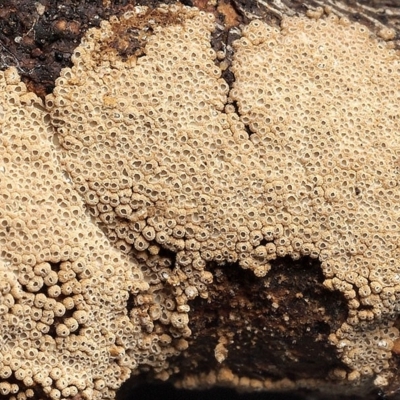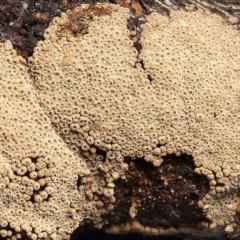Merismodes anomala
The fruit body is cup-like, up to half a millimetre in diameter and about the same, or slightly more, in height. The cup mouth’s margin may curve inward and the fruit body may taper slightly towards the base of the cup. The outer surface is covered with brown hairs, which give the fruit body an overall brownish look, but the inner surface is smooth and creamy. The fruit-bodies appear in large colonies and, though separate, may be very densely packed. In dry conditions the mouths of the cups close up.
The fruit bodies grow from the underside of dead wood, so that the mature cups face downward.
Spore print: white.
The hairs are often curled towards their tips and are granularly encrusted, except at the apices (which are colourless and often swollen). This is a basidiomycete and such a cup-like basidiomycete is often referred to as a cyphelloid fungus. Most cup-like fungi are ascomycetes.
Merismodes anomala is found in many countries but some evidence suggests that this ‘species’ is in fact a group of species. The genus does need more investigation.
Look-alikes
Australian cyphelloid fungi are still poorly studied. The small size of the fruit bodies and their occurrence on the underside of wood makes them easily overlooked. Several brownish cyphelloid species occur in the ACT and belong to at least two genera: Merismodes and Maireina. In the latter the hairs are encrusted to their apices, which are rounded (and may be colourless) but are not swollen.
Merismodes fasciculata fruit bodies may be up to a millimetre in diameter, are deeply cup-like to somewhat tubular and typically grow in clusters from a common base. There is no conclusive evidence of its occurrence in Australia. ALA does report it, but that report is based on unconvincing colony photographs, not on specimens.
Merismodes anomala is listed in the following regions:
Canberra & Southern Tablelands
Species information
- Merismodes anomala Scientific name
- Common name
- Not Sensitive
- Cosmopolitan
- Non-invasive or negligible
- Machine learning
Location information
-
Maps
ANBG






